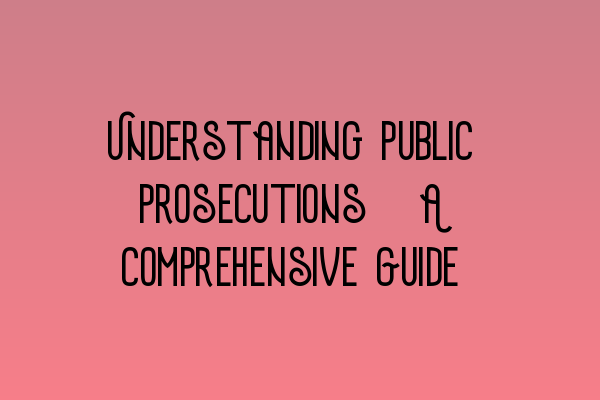Understanding Public Prosecutions: A Comprehensive Guide
If you find yourself facing criminal charges or have an interest in criminal law, it is crucial to understand the process of public prosecutions. In this comprehensive guide, we will provide you with all the essential information you need to know about public prosecutions in the UK.
What is a Public Prosecution?
A public prosecution is the legal process by which the state brings criminal charges against an individual or entity believed to have committed a crime. The aim of a public prosecution is to ensure justice is served and to maintain law and order within society.
The Role of the Crown Prosecution Service (CPS)
In the UK, the Crown Prosecution Service (CPS) holds the responsibility of conducting public prosecutions. The CPS is an independent organization that works closely with the police and other investigative agencies to decide whether or not to bring charges against a suspect.
Once the police have completed their investigation, they will present their findings to the CPS. The CPS will then carefully review the evidence and determine whether there is sufficient evidence to proceed with a prosecution in court. It is important to note that the CPS must only pursue cases where there is a realistic prospect of conviction and where it is in the public interest to do so.
The Criminal Justice System
Public prosecutions are part of the wider criminal justice system. This system encompasses various stages, from the initial investigation to the final verdict. It is designed to ensure a fair and impartial trial for all individuals accused of a crime.
The criminal justice system includes the police, the CPS, defense lawyers, judges, and juries. Each of these entities plays a crucial role in the process, ensuring that the rights of the accused are protected and that justice is served.
The Stages of a Public Prosecution
A public prosecution typically goes through several stages, each with its own specific procedures and requirements. Let’s take a closer look at each of these stages:
- Investigation: The police gather evidence and interview witnesses to build a case against the suspect.
- Charge Decision: The CPS reviews the evidence and decides whether or not to bring charges against the suspect.
- Initial Hearing: The suspect appears before a magistrate, and the charges are formally presented.
- Pre-Trial Proceedings: Both the prosecution and the defense exchange evidence, identify witnesses, and prepare their cases for trial.
- Trial: The case is presented in court, and the evidence is examined. The judge or jury determines the defendant’s guilt or innocence.
- Sentencing: If the defendant is found guilty, the court determines an appropriate punishment.
Importance of Legal Representation
If you find yourself facing criminal charges, it is essential to seek legal representation. A skilled criminal defense lawyer can help you navigate the complexities of the criminal justice system, ensure your rights are protected, and advocate for the best possible outcome in your case.
At SQE Criminal Law & Practice Law UK, we offer comprehensive SQE 1 and SQE 2 preparation courses to aspiring solicitors. Our courses cover all aspects of criminal law, including public prosecutions, to equip you with the knowledge and skills necessary to excel in your legal career.
For practice exams and mock quizzes to help you prepare for the SQE 1 exam, check out our SQE 1 Practice Exam Questions and SQE 1 Practice Mocks FLK1 FLK2.
To enhance your preparation for the SQE 2 exam, we also offer comprehensive SQE 2 Preparation Courses. These courses cover all areas of legal practice, including criminal law, ensuring you have a solid foundation to pass the exam with confidence.
Stay Updated on SRA SQE Exam Dates
If you plan to pursue a career in law, it is crucial to stay informed about the SRA SQE exam dates. These exams are an essential step towards qualifying as a solicitor in England and Wales.
To keep track of the upcoming SRA SQE exam dates, visit our article on SRA SQE Exam Dates. By knowing the exam dates in advance, you can plan your preparation and ensure you are fully prepared for the exams.
We hope this comprehensive guide has provided you with a better understanding of public prosecutions in the UK. If you have any further questions or require legal assistance, do not hesitate to reach out to SQE Criminal Law & Practice Law UK.
